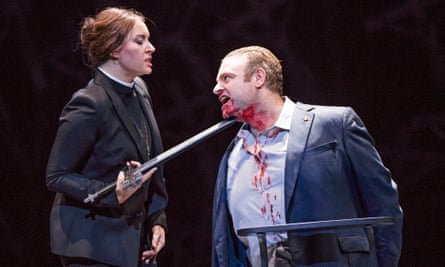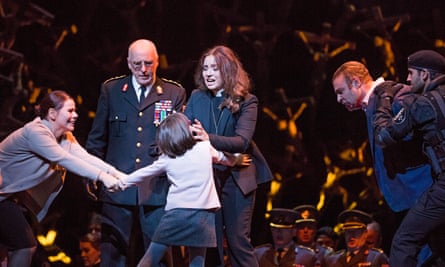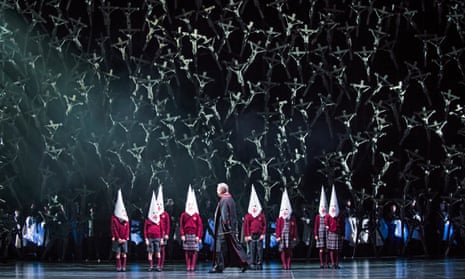The Royal Opera’s new production of Norma, its first since 1987, is the work of Àlex Ollé of La Fura dels Baus, whose interpretation is by turns striking and perverse, sometimes beautiful, often irritating. Though it strains credibility from the outset, Ollé reimagines Bellini’s tragedy of love and betrayal across enemy lines in Roman-occupied Gaul as an examination of the relationship between desire and fundamentalism. Norma (Sonya Yoncheva), the Druid priestess trapped in a disastrous clandestine affair with an imperial officer, has implausibly become the spiritual leader of a paramilitary Catholic sect. Pollione (Joseph Calleja) is a glib political type in a suit, weak-willed and vacillatingly liberal. We first encounter Sonia Ganassi’s prim, naive Adalgisa serving as an altar girl. Brindley Sherratt’s Oroveso is a gun-toting fanatic.

Ollé’s visuals frequently swamp Bellini’s profoundly human drama. Alfons Flores’s over-dominant set is a vortex of crucifixes, its swirling shape reminiscent of Gustave Doré’s illustrations for Dante’s Divine Comedy, reminding us that we are in a living purgatory. The big ritual scenes allude both to the Spanish Inquisition and the Ku Klux Klan, yet the imagery and stagecraft sometimes prove distracting. Norma lives in a modern flat from which religious artefacts have been removed, and where her children watch Watership Down on TV, though the sight of her daughter bouncing around on a space hopper gets in the way during her big reconciliatory duet with Adalgisa. The most remarkable image comes during Casta Diva, when a huge censer is swung out from the stage over the front rows of the auditorium. But Bellini demands absolute theatrical stillness at this point, and we don’t really need it at all.
Musically one is similarly left in two minds. The production was planned as a vehicle for Anna Netrebko, who withdrew from the proceedings in April on the grounds that her voice had “evolved in a different direction” from Bellini’s music. Yoncheva, her replacement, is singing the immensely demanding title role for the first time, and not all of it works. Exquisite lines, particularly in her first duet with Ganassi, alternate with some lunged coloratura and effortful high notes. Her characterisation is as yet imperfectly realised and the Medea-like extremes of the first act finale elude her. But she is affecting in the final scenes, when the emotional frenzies gradually drain away and Bellini resorts to a drastic simplicity of expression.

Calleja, handsome-sounding, is naturally more at home in this music, his voice ringing easily through his arias, his characterisation growing in depth as the performance progresses. Ganassi can be sensitive, though her voice is not quite what it was. Sherratt sounded underpowered at the start, but wasn’t helped by having to begin his first aria at the back of the stage. Antonio Pappano conducts with a keen sense of drama, but could, just occasionally, turn the orchestral volume down a bit to help the singers. It’s finely played, and the choral singing is excellent.

Comments (…)
Sign in or create your Guardian account to join the discussion